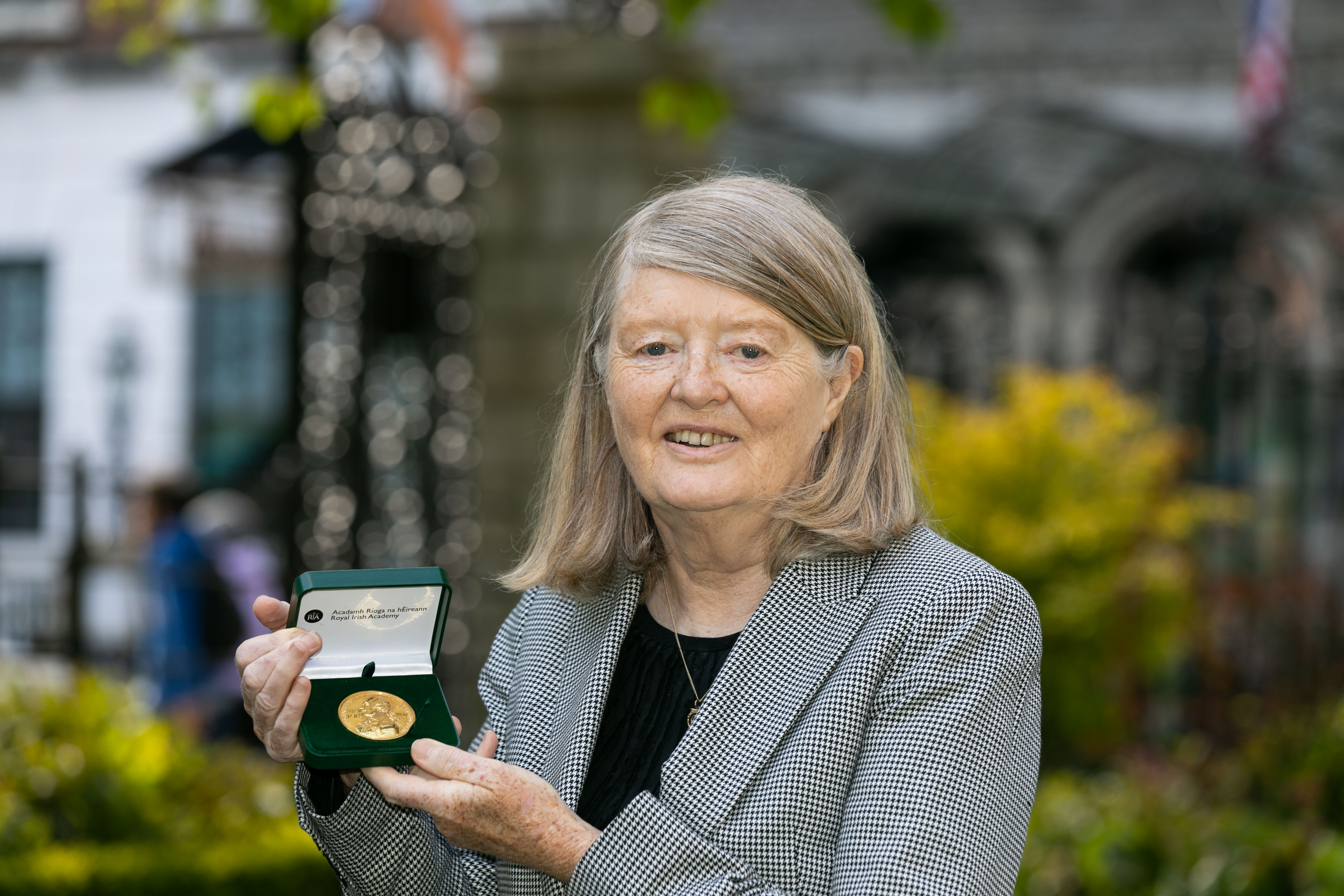Mary E. Daly MRIA

Image caption: Mary E. Daly MRIA, 2020 RIA Gold Medallist in the Humanities.
Citation on the awarding of the 2020 RIA Gold Medal in the Humanities to Mary E. Daly MRIA
Written on 12 May 2021
Mary Daly is an internationally recognised scholar whose pathbreaking research has had a transformative impact on Irish historiography. She has also been a remarkable academic leader both in University College Dublin and in the Royal Irish Academy.
Emeritus Professor of Irish History at University College Dublin, Mary Daly’s impact on the writing of 19th and 20th century Irish history has been truly ground-breaking. She has succeeded spectacularly in her lifelong goal of broadening the scholarly account of Ireland’s past from a traditional focus on high politics, nationalism, unionism, and Anglo-Irish relations (while also making discerning contributions in those very fields). Her approach represents a significant challenge to current and future historians to leave their disciplinary silos and seek a more integrated approach to the writing of history.
Professor Daly is a remarkably prolific author. She is the sole author of 10 books as well as numerous articles and book chapters. Her research interests range widely from women’s history, the history of marriage and family, and migration, to economic development, state formation, and citizenship. Taken as a whole, this formidable body of scholarship combines social, economic, and political analysis in an original and often provocative interpretation of Irish history in the late nineteenth and twentieth centuries.
A pre-eminently archives-driven historian, Professor Daly’s publications display a consistent record of rich and extensive archival research. Her pioneering 1984 book Dublin: the deposed capital: a social and economic history 1860–1914, was the first major work on the urban history of nineteenth century Ireland and the first to use the state records from the Chief Secretary’s Office as a source for social and economic history.
Professor Daly also played an influential role in the opening up of archives, in particular the National Archives of Ireland, in the late 1980s and 1990s. The availability of this material meant that the history of post-independence Ireland could now be written from primary sources and Professor Daly took full advantage of the newly available material; an early example of this is her 1992 monograph, Industrial Development and Irish National Identity, 1922–1939 that was one of the first publications on twentieth-century Ireland to be based on government papers. It is a tour de force of erudition and of skilful weaving of different sorts of history.
Professor Daly’s more recent publications, Sixties Ireland: reshaping the economy, state and society, 1957-73 (2016) and The slow failure: population decline and independent Ireland, 1920-1973 (2006) are models of archival research that reach out far beyond their roots in debates within government departments, to transform our understanding of everyday lived experience in post-war Ireland and its UK diaspora.
In her research and writing Professor Daly has sought to examine, and often challenge, some of the more simplistic assumptions about modern Ireland, such as Irish exceptionalism or the exaggerated economic and social revolution of the Lemass era. Consequently, her publications demonstrates a strong commitment to viewing Irish history in an international or trans-national context.
Professor Daly's impact on the study of modern Irish economic and social history is, therefore, immense and, most importantly, it is continuing. Throughout her career she has also taught, supported and mentored a significant number of history students at undergraduate, post-graduate and post doctorate levels – inspiring current and future generations of historians.
In addition to her intellectual contribution to Irish historical studies, Mary Daly has been an influential leader in Higher Education in Ireland and in Irish society more generally. As the founding director of the Humanities Institute of Ireland (latterly the UCD Humanities Institute), she created a vibrant and transformative research community for postgraduate scholars in the humanities. She has been a member of a number of prominent government advisory bodies and boards including the Higher Education Authority, the Irish Manuscripts Commission and the Decade of Centenaries Expert Advisory Group. Most recently, her membership of the Commission of Investigation into Mother and Baby Homes brought together her knowledge of 20th-century Irish social history, her archival expertise and her deep commitment to public service. The final report of the Commission included the most comprehensive analysis yet to be published of the wide societal context in which the institutionalisation of single mothers was normalised.
Elected to membership of the Royal Irish Academy in 1991, Professor Daly served as Vice-President in 1996–97 and again in 2008-09. She was a member of Council 1997–2000, 2007-08 and 2009-11 and was Academy Secretary between 2000 and 2004. In 2014, she was elected as the first female president of the Academy. As an active and imaginative President, she championed many programmes and events, among them her support for the conference on making peace in Ireland, which has now been recorded in an Academy publication, ‘Brokering the Good Friday Agreement: the untold story’. The profile of women members was greatly raised by her election as President and her determination to increase the number of female MRIAs has borne fruit, and those efforts continue in the Academy today.
In summary, Mary Daly’s academic and public service record amply fulfil all the criteria for one of the Academy’s highest awards.
